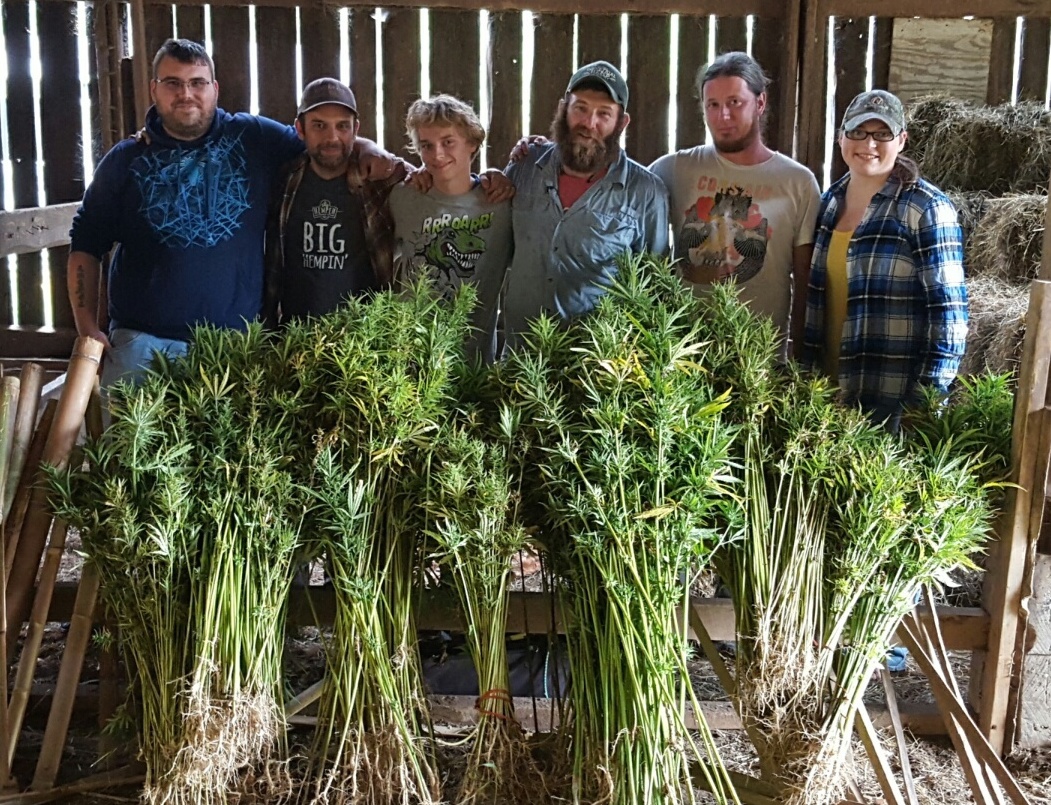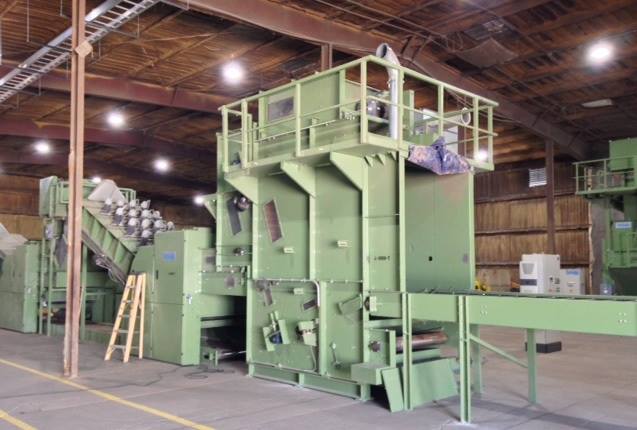
WHAT THE HEMP: Despite hemp's continued federal classification as a Schedule I controlled substance, states are allowed to enact laws surrounding the farming of industrial hemp. Smiling Hara Tempeh owner Chad Oliphant, second from left, and Kentucky farmer Mike Lewis, fourth from left, are pictured with other hemp advocates after harvesting the newly legalized crop in Kentucky. Oliphant and Lewis were introduced through Accelerating Appalachia's network of nature-based business owners. Image courtesy of Oliphant
North Carolina farmers may soon be the newest competitors in the worldwide hemp market, pending a signature from Gov. Pat McCrory. Growing industrial hemp, as opposed to simply importing and processing it for use in derivative products, would be legal in North Carolina under Senate Bill 313 — which originally pertained to license plates and registers of deeds until a subsequent addition by sponsor Rep. Jeff Collins, R-Nash County. McCrory’s approval is the last step after speedy affirmative votes in both the N.C. House (101 votes to 7) and Senate (42 votes to 2).
“From all indications, the governor is going to sign it,” says Blake Butler, hemp advocate and organizer of Asheville’s recent HempX festival.“He’s in support of it.”
If the bill is enacted, an industrial hemp commission will be tasked with managing a statewide pilot program to monitor the inaugural cohort of commercial growers and researchers of the versatile crop, which is used to make thousands of products.
Carolina cannabis
Hemp is a variety of the cannabis plant, but smoking it doesn’t produce a high. By definition, industrial hemp must contain less than 0.3 percent of THC — the substance responsible for weed’s psychoactive effects — while marijuana’s average THC content has climbed from about 10 percent THC by weight to 30 percent over the past 30 years, according to a study by Colorado-based research lab Charas Scientific.
Despite containing only trace amounts of THC, the federal government lumps hemp in with marijuana as a Schedule I drug under the Controlled Substances Act, meaning the plant’s production and use fall under the watchful eye of the U.S. Drug Enforcement Agency.
The DEA’s main concern surrounding hemp is that “commercial cultivation could increase the likelihood of covert production of high-THC marijuana, significantly complicating DEA’s surveillance and enforcement activities and sending the wrong message to the American public concerning the government’s position on drugs,” according to a 2015 Congressional Research Service report prepared for Congress, titled “Hemp as an Agricultural Commodity.” Hemp advocates, however, claim that cross-pollination between hemp and marijuana would actually lower the THC content of the latter, devaluing the harvest.
Still, the 2014 U.S. Farm Bill (P.L. 113-79) allows states to enact their own regulatory systems surrounding industrial hemp cultivation.
Until now, North Carolina law remained silent on the subject, even as other Southern state governments accommodated the controversial plant. Currently, 20 states have adopted Farm Bill-compliant laws to accommodate cultivation under varying circumstances.
If signed into law, North Carolina’s new bill will call for the formation of an industrial hemp commission to manage the state’s pilot program. The commission will issue paid permits (their number and geographic distribution are still to be determined), establish a reporting system for growers and ensure compliance with federal law. Also included in the industrial hemp bill is a plan to establish research partnerships with N.C. State University and North Carolina A&T University, as well as to conduct studies on economic potential and best agricultural practices.
Growing business
To be clear, it is already legal, with the correct paperwork, to process hemp in North Carolina into any of its thousands of derivative products, such as food products, hygiene items, textiles, building materials and biofuel. But for decades, North Carolinians have been forbidden to grow hemp. Instead, companies have relied upon neighboring states and other countries, including leading exporter China and dozens of other nations, for their hemp needs. To capitalize on the new legislation, then, will require action from North Carlina’s farming community.
“Between thousands of acres of unused farmland and vacant textile mills in every county, this is a true, unrecognized economic opportunity for our region,” Butler says, but “it’s not even on [farmers’] radar.”
Aspiring grower Claudia Townsend says she has applied to attend the Organic Growers School’s new year-long Farm Beginnings course with hopes of launching a hemp farm, despite the school’s current lack of hemp-specific expertise. Until now, local landowners have been hesitant to discuss leasing her a space for the venture, but Townsend is hopeful that legalization will legitimize her proposals.
Butler says he hadn’t heard any interest from WNC farmers in growing hemp until his inaugural HempX festival last month, but “farmers are starting to engage,” he says, noting an uptick in hemp-related inquiries since news of the legislative progress.
Molly Nicholie, Appalachian Sustainable Agriculture Project’s local food campaign program director, reports a similar silence in ASAP’s network, adding: “I think that a lot of [farmers] don’t want to put time into thinking about it until it’s legal [and they] will sit back and watch other folks do it until they see if it’s worth their time.”
Meanwhile, Western North Carolina companies that are particularly hip to hemp have been eagerly awaiting the opportunity to tighten the geographic spread of their supply chains.
Smiling Hara Tempeh co-owner Chad Oliphant, for example, sourced hemp from Canada for the company’s pilot batches of Hempeh before partnering with farmer Mike Lewis’ Growing Warriors Project in Kentucky. Oliphant says Smiling Hara will be looking to purchase from North Carolina growers as soon as it’s feasible, but he expects that to take a few years.
“I have been involved with hemp farmers in Kentucky, and we are still figuring out logistics such as processing, transport and pricing,” he says. “It will be interesting to see how quickly the industry will be able to develop in North Carolina.”
Similarly, Plant chef Jason Sellers says buying regional hemp would “inspire me to use more of it in the kitchen.”
Asheville’s Alembic Studio LLC designs and implements hempcrete buildings across North America and in New Zealand using hemp from the latter, but “we have long anticipated the opportunity to be able to source this product from our own state,” says Timothy Callahan, Alembic technical design analyst and master builder.
Sara Day Evans, founding director of Accelerating Appalachia, says aspiring hemp entrepreneurs are inquiring about participating in her organization’s next nature-based business accelerator program. “We have applicants from Kentucky, West Virginia and North Carolina — all doing hemp. Most of them are actually small processors, which is good,” she says.
Notably, publicly traded organization Hemp Inc. recently purchased one of the nation’s only decortication machines — a specialized piece of equipment used to break hemp into fiber and hurd for further processing. The company then relocated the asset to a subsidiary in Spring Hope (located in Nash County, which the industrial hemp bill’s sponsor Collins represents).
In light of the disparity in interest to date between WNC farmers and local commercial users, Butler says his team may soon hold information sessions on potential hemp opportunities.

To plant or not to plant
Even if they are interested in pursuing hemp as an auxiliary or main crop, farmers will find it difficult to unearth conclusive figures on hemp’s demand and profitability, due to piecemeal studies. Further, differing strains of hemp are better for different end uses, meaning aggregate hemp figures may not be meaningful for each submarket.
Allowing for limited data, the previously mentioned CRS study “Hemp as an Agricultural Commodity” estimates nearly $36.9 million in U.S. imported seeds and fibers (predominantly used as manufacturing inputs), which represents a sixfold increase since 2005. Annual sales for U.S. hemp-based products made with those seeds and fibers, along with other hemp-related imports, exceed $580 million.
After Kentucky took advantage of the 2014 Farm Bill’s deferral to state laws, Lewis became the first person in the country to legally grow hemp. He says his crops are “well-adjusted and perform just fine without any fertilizer,” although fertilizer was used as part of trials.
Strains for both food and fiber performed well on his land, but he says other farmers growing strains with high levels of CBD (a nonpsychoactive cannabinoid being researched for potential medicinal applications) had trouble with spider mites.
With proper planning, growers can get multiple harvests in a single year, but Lewis notes that his back-to-back plantings drew twice the nutrients from the soil. “The economic feasibility still needs to be determined,” he says.
The National Hemp Association’s website, meanwhile, credits the plant for requiring few pesticides and returning nutrients to the dirt, reading: “Hemp has been grown on the same soil for 20 years in a row without any noticeable depletion of the soil.”
Despite hemp’s attributes and his belief in the potential for profits, Lewis says he’s still traversing the learning curve.
“I don’t anticipate making any real farm gate income from my crops for another two years,” he says. “The problem we currently have is a bottleneck of [general agriculture product] processors. The only processors are very large in scale, many requiring 50,000 acres of product a year.”
“That type of production level ultimately keeps family farms as price-takers,” he continues. “If we are really going to see the real economic potential of this crop realized, it will need to be grown, processed and sold as locally as possible. Otherwise we are playing into the commodity markets, and that doesn’t usually equal profits for a small-scale producer like me.”
For more information on hemp and hemp legislation, visit nationalhempassociation.org orncindhemp.org.
No comments:
Post a Comment